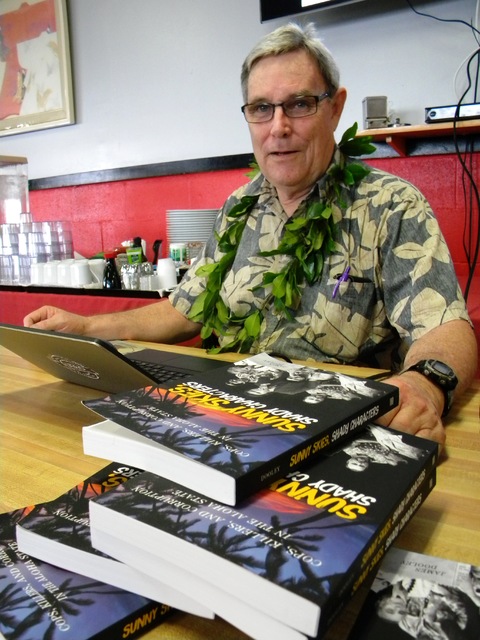HILO — There’s an entire chapter in Jim Dooley’s book about the late Waimea rancher and businessman Larry Mehau.
But so many mysteries surround the Big Island’s role in government corruption and organized crime that Dooley, already working on his second book, says there’s likely to be at least one more Big Island chapter in that one, too.
Dooley — an investigative reporter in Honolulu for more than 30 years whose work led to the indictment of former Honolulu Mayor Frank Fasi on bribery charges and who exposed corrupt huis, government contracting fraud and organized crime and yakuza — spoke to the Big Island Press Club in Hilo on Friday.
Dooley signed copies of his book, “Sunny Skies, Shady Characters: Cops, Killers and Corruption in the Aloha State,” as he chatted with press club members, many of whom are former journalists themselves.
The book ties Mehau to organized crime through sworn testimony of police officers and his close association with and employment of convicted felons.
Mehau, who died Dec. 22, 2015, at age 86, was an influential and controversial political power-broker. A former Honolulu police officer, he was a close associate to Democratic Govs. John A. Burns and George Ariyoshi and the powerful late U.S. Sen. Daniel Inouye.
“He was investigated over and over again by state, local and federal investigators and nobody ever laid a finger on him,” Dooley said. “The man had connections at the top and the bottom of society that just didn’t quit.”
Mehau also wielded influence in the entertainment industry and at one time was business manager for the late Hawaii superstar Don Ho.
Most of the 25 or so in the audience were familiar with Mehau and the allegations surrounding his affiliations.
They pressed Dooley on the “real answer,” hoping for additional insight into the powerful Big Island rancher. Now that Mehau is dead, there should be less of an expectation of privacy that could lead to lawsuits, several suggested.
Dooley couldn’t be swayed, repeating his comments that Mehau had been investigated up and down and nothing ever stuck.
Ariyoshi, in an interview with Hawaii News Now shortly after Mehau’s death, had bristled at the rumors about his longtime friend.
“As far as I’m concerned he was a very honest person, and this story about the ‘godfather’ is ridiculous,” Ariyoshi said.
In later years, Mehau became less of a public figure, but remained politically active, using his Waimea ranch to host a 2006 campaign fundraiser for former U.S. Sen. Daniel Akaka.
In 1985, Rick Reed, a special assistant for then-Honolulu City Prosecutor Charles Marsland who was running for Congress, referred to Mehau as “the godfather of organized crime in Hawaii” and “the most powerful person in Hawaii” whose “influence permeates our government, our criminal justice system and even our business community.”
Mehau strongly disputed Reed’s allegations and sued Reed, Marsland and Donald Carstensen, a former Honolulu police officer who led Marsland’s organized crime unit, for libel and invasion of privacy.
A Honolulu Circuit Court jury ruled in Reed’s favor in 1992, but Judge Wilfred K. Watanabe vacated the verdict, ruling Mehau was entitled to a new trial. The judge said the jury reached its verdict despite the “great weight of credible evidence” to the contrary.
The state Supreme Court affirmed Watanabe’s ruling, and the lawsuit was settled in 1996.
(Disclosure: Nancy Cook Lauer is a member of the board of the Big Island Press Club and was instrumental in arranging Dooley’s appearance before the club.)



